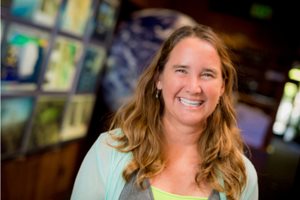17 November 2015
Shaking up science education with STEAM
When a big earthquake hits, you’ll most likely find Debi Kilb, a project scientist at Scripps Institution of Oceanography, on CNN or one of the other cable networks explaining the physics of earthquakes for the lay audience.
 “I’m always asking my husband ‘You recorded it, right?’” she said with a laugh.
“I’m always asking my husband ‘You recorded it, right?’” she said with a laugh.
However, she does much more than hit the TV circuit at critical times.
An expert in seismology, Kilb focuses much of her research on aftershock sequences and what causes them—something she focused on in her postdoctoral work at Princeton University.
Also, the noted seismologist is the director of Scripps Institution of Oceanography Games (SIO GAMES, siogames.ucsd.edu) at UC San Diego, where she is overseeing programs throughout the San Diego area that teach everything from computer programming to robotics to making a disaster movie based on real science.
How did she get that responsibility?
Consider it a combination of temperament and talent.
“Whenever a school group requested a tour of Scripps, I’d always be one of the first to volunteer,” Kilb said.
Another factor that made her new role a perfect fit for Kilb is her focus on creating three-dimensional computer visualizations to better explain the interaction of earthquakes and aftershocks. Instead of words and static images, Kilb found interactive visualizations could convey what words could not.
“When people can visually see and interactively explore connections between different data sets, a switch goes on,” she said. “Once you see that switch go on in someone—the recognition and understanding—it’s addicting. You want to make it happen again and again.”
To accomplish that, Kilb and her SIO GAMES team worked to take their visualization tools to the next level, creating educational video games that explore everything from earthquakes to the deep-sea environment.
So now, Kilb splits her time between research and teaching students about current Scripps’s research. She loves revealing everything the Scripps organization does, including studies of the earth, ocean, planets, and climate to name a few, as a way to dispel the myth that “scientists at Scripps only look at fish,” she said.
At a recent talk about earthquakes at the Elementary Institute of Science, an organization in Southeast San Diego that offers affordable hands-on science classes, she sparked the students’ interest, which always energizes Kilb. “They asked questions nonstop,” she said. “It was an hour talk, and it could have gone on for another hour.”
Kilb’s presentation on earthquakes was part of a three-way partnership between Scripps Institution of Oceanography, UC San Diego Extension, and the Elementary Institute of Science to offer a variety of classes in STEAM—the acronym for science, technology, engineering, art, and math—for students in grade school through high school, with a special focus on reaching those living in underserved communities.
“We are now working with a new population of kids who otherwise would never be able to take classes in robotics or computer programming,” Kilb said.
The partnership is part of UC San Diego’s effort to ensure it is a vital educational resource to communities throughout the San Diego region, said Ed Abeyta, assistant dean for community engagement and director of precollegiate programs for UC San Diego Extension.
“UC San Diego Extension and Scripps Institution of Oceanography are working to connect the campus to the community,” Abeyta said. “All of the K–12 programs we offer are part of a broader campus effort to engage with every community in the region that will in turn strengthen our university and San Diego.”
Abeyta worked closely with Kilb to program the classes, making sure they were hands-on so that students understand the practical applications of the knowledge they are acquiring. “We want to combine the fun with the science because then it’s more than just numbers and math,” Kilb explained.
Because of that mission, this new partnership is continuously trying to tease out the joy of science and learning. One of the team’s latest ideas is to host movie nights at the Elementary Institute of Science and have students and their parents watch a film, such as Finding Nemo, so they can learn more about ocean science from an expert at Scripps.
Patsy Tomlin, who serves on the board of the Elementary Institute of Science, praised Kilb’s unique and fun-filled approach, saying it has injected a lot of excitement into the organization’s programs. “Debi is a source of creativity and energy and is offering us content that we’ve never been able to access before,” she said.
For Kilb, who graduated from UC San Diego with a degree in math and computer science, it is gratifying and important work to help train the next generation of scientists, engineers, and artists, especially the younger students.
“These kids are not afraid to try stuff,” she said. “All too often there is a time when a kid’s curiosity in science and the world around them is turned off. We want to make sure we get to them before that turnoff phase.”